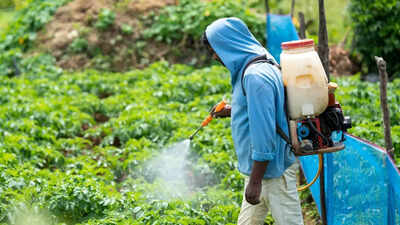ARTICLE AD BOX

A growing body of scientific evidence suggests that common agricultural pesticides may be contributing to declining sperm counts and rising rates of male infertility. A new review published in the journal Environmental Research examined 21 laboratory studies conducted between 2005 and 2025 and found consistent links between neonicotinoid insecticides and impaired reproductive health in male rodents.
These chemicals are the most widely used class of insecticides in global agriculture, raising important questions about everyday exposure through food and the environment.
Infertility concerns linked to pesticide exposure
The review was led by Sumaiya S. Irfan, MPH, an epidemiologist at George Mason University. Her team analysed experimental studies published between 2005 and 2025 and found a clear pattern: animals exposed to neonicotinoid pesticides showed lower sperm counts, reduced sperm motility, altered sperm structure, and damage to testicular tissue."We concluded it is possible that exposure to these chemicals can lower sperm quality, disrupt hormones, and damage testicular tissue," Irfan said. "The pattern was clear across different compounds and research groups."Her co-author, Veronica G. Sanchez, a master of science in chemistry student and research assistant at the George Mason Center for Applied Proteomics and Molecular Medicine, emphasized the real-world relevance of this work.
"Many individuals may not realize that insecticide residue found on food could be a contributing factor to infertility," Sanchez said. "Every study reviewed showed harm to sperm quality in male rodents exposed to neonicotinoids."
Why these findings raise concern for humans
Although the review focused on laboratory animals, the biological process of sperm development is similar across mammals. So when reproductive disruption appears consistently in rodents, scientists say it raises reasonable concern for human health.Human exposure to neonicotinoids is widespread. A US biomonitoring survey found chemical markers of these pesticides in about half of the general population aged three years and older, with levels often higher in children. Neonicotinoids are systemic pesticides, meaning they are absorbed into plant tissues. As a result, residues may persist inside fruits, vegetables, grains, and nectar, even after washing."This is not simply surface contamination," Sanchez explained. "These pesticides enter the plant itself, so rinsing produce cannot fully remove them."
How pesticides might affect sperm
Across the reviewed studies, neonicotinoid exposure was associated with:
- Increased oxidative stress that damages sperm cells and DNA
- Disruption of reproductive hormone signaling
- Tissue-level damage in the testes that affects sperm formation
- Reduced ability of sperm to swim effectively
- These changes impair fertility potential and may also influence long-term reproductive health.
Experts call for deeper investigation
Melissa J. Perry, Dean of the College of Public Health at George Mason University and a contributing author on the study, emphasized the importance of continuing research."Neonicotinoid insecticide use in US agriculture has grown significantly over the last decade, so we know that exposures happen routinely for a large number of people," Perry said.
"We need to conclusively determine how this affects members of the public."The researchers stress that while the rodent data are strong, more work is needed to understand how typical human exposures affect actual fertility outcomes. This includes examining exposures during sensitive life stages such as puberty and early adulthood.
What individuals can do now
Consumers can reduce some exposure through basic steps:
- Wash fruits and vegetables thoroughly under running water
- Avoid applying insecticides at home or in gardens when possible
- Consider choosing organic produce for items known to carry higher pesticide residues
However, Irfan notes that these measures cannot eliminate systemic pesticides."Because neonicotinoids are absorbed throughout plant tissues, they are very difficult to remove completely," she said. "The best approach is awareness and informed food choices."
Looking ahead
As infertility affects an estimated one in six people worldwide, according to the World Health Organization, understanding environmental influences on reproductive health is becoming increasingly urgent. The researchers say that while pesticides play a critical role in global food production, their long-term health trade-offs require closer scientific and regulatory attention.The emerging evidence suggests that the male infertility crisis may not be solely a biological or lifestyle issue. It could also be rooted, quite literally, in the food we grow and the chemicals we use to protect it.Note: The information provided in this article is for educational purposes only and is not intended as medical advice. Always consult with a qualified healthcare professional before starting any new medication or treatment and before changing your diet or supplement regimen.

 1 hour ago
5
1 hour ago
5









 English (US) ·
English (US) ·